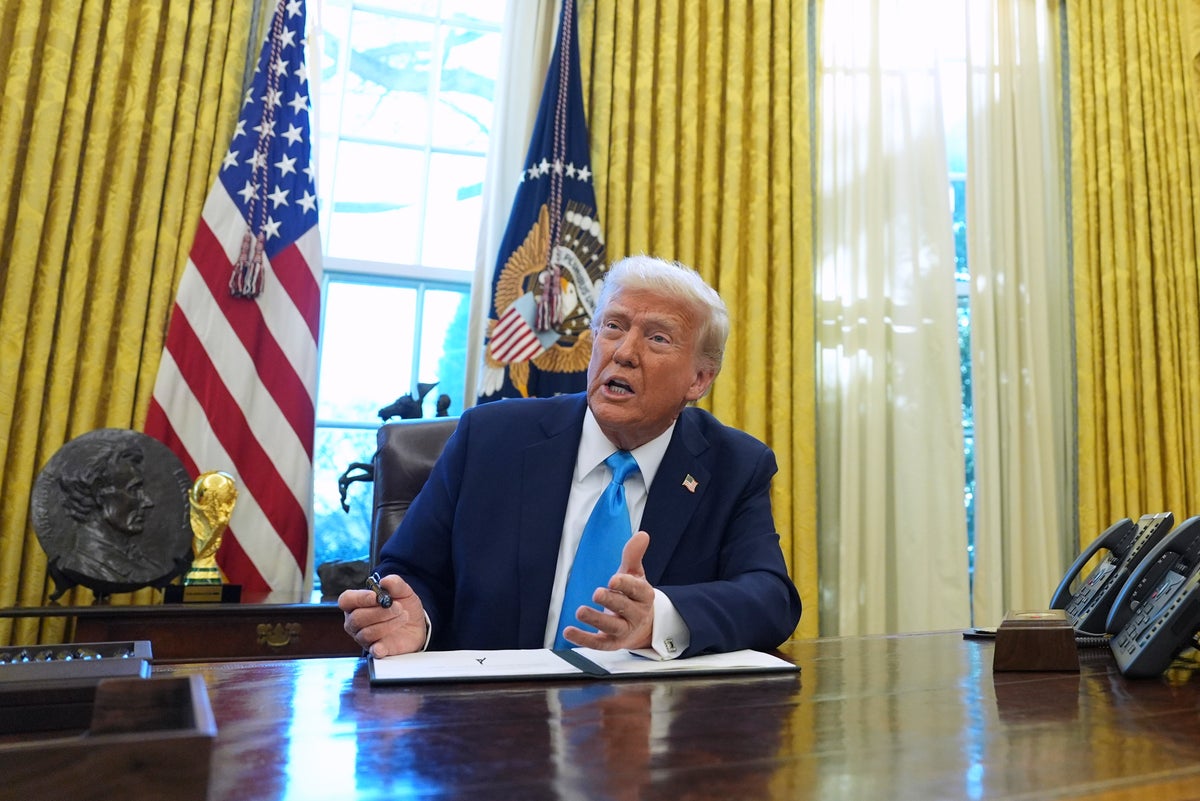Musk’s expanding role triggers efforts to check his power
Elon Musk has seen a flood of attempts to check his power as he expands into nearly every corner of the government. In the few short weeks that President Trump has been in office, Musk and his team at the Department of Government Efficiency (DOGE) have accessed or attempted to access databases at a number...

Elon Musk has seen a flood of attempts to check his power as he expands into nearly every corner of the government.
In the few short weeks that President Trump has been in office, Musk and his team at the Department of Government Efficiency (DOGE) have accessed or attempted to access databases at a number of departments; gutted the workforce of the U.S. Agency for International Development (USAID); and helped spearhead a government-wide employee buyout program.
And he doesn’t plan to stop — Musk has signaled on social media his team will look into the Centers for Medicare and Medicaid Services for potential spending waste. Transportation Secretary Sean Duffy said DOGE staffers were going to “plug in to help upgrade our aviation system.”
Government agencies are facing about a half dozen lawsuits over DOGE and its staffers’ efforts to access various federal databases.
While several focus on privacy law violations, others go after the structure of DOGE itself, which was originally conceived as an advisory board to the president before an order from Trump supplanted the U.S. Digital Service, turning it into DOGE.
Kel McClanahan, an attorney who has sued over emails sent from the Office of Personnel Management (OPM) that enabled it to send the buyout to all government employees, said Musk has created “a cybersecurity nightmare waiting to happen, and it's going to blow up.”
“There are rules about how information is accessed and stored in federal government, and the reason for those rules is to protect the average American from government overreach, from the government misusing the information it has about you,” he said.
“And what Musk and Trump … have done here, and Treasury and everybody else, is say, ‘Well, those rules don't matter to us — we’re in a hurry.’”
Unions filed a similar suit at the Treasury Department and earned an early victory when the Justice Department agreed to give the DOGE employees “read access” only to files amid the litigation. Unions, however, are still seeking to block the move entirely, calling it an unprecedented intrusion.
Nonetheless, a close ally of Musk’s will be installed at Treasury Department, The Washington Post reported Friday, replacing a high ranking official who resigned rather than carry out an order to block foreign aid.
Lawsuits at the departments of Labor and Education are also pending as are a trio of others that say Musk’s work violates the Federal Advisory Committee Act, which dictates how such groups must be formed and managed.
Democratic lawmakers expressed their alarm directly to Trump this week, warning that DOGE staffers were bypassing practices designed to safeguard classified materials.
“These agencies all hold large volumes of classified information, and bypassing established safeguards to protect such information could irreparably damage national security. Whatever DOGE’s mission entails, a highly irregular process in which security officials are threatened and punished for following laws and policies designed to protect sensitive information is unacceptable and dangerous,” Democratic leaders on each committee wrote in a letter spearheaded by Intelligence Committee ranking member Jim Himes (D-Conn.).
Intelligence Democrats on the Senate side raised similar concerns, noting Musk’s authority remains unclear as does the status of his staffers as they pursue classified files.
“The scope of DOGE’s access only seems to be expanding,” Sen. Mark Warner (Va.), the top Democrat on the committee, wrote with other panel Democrats.
“No information has been provided to Congress or the public as to who has been formally hired under DOGE, under what authority or regulations DOGE is operating, or how DOGE is vetting and monitoring its staff and representatives before providing them seemingly unfettered access to classified materials and Americans’ personal information.”
The White House has offered vague details about to whom Musk is accountable — other than Trump.
“Elon can’t do, and won’t do, anything without our approval,” Trump told reporters Monday. “And we’ll give him the approval where appropriate, where not appropriate we won’t.”
White House press secretary Karoline Leavitt was asked Wednesday what steps the administration is taking to ensure Musk avoids conflicts of interest given his extensive financial investments. Leavitt suggested Musk would be the one to determine when to step away from a particular project.
“The president was already asked and answered this question this week, and he said if Elon Musk comes across a conflict of interest with the contracts and the funding that DOGE is overseeing that Elon will excuse himself from those contracts, and he has again abided by all applicable laws,” Leavitt said.
Musk has been designated as a special government employee. The Justice Department defines that role as an individual who works or is expected to work for the government “for 130 days or less in a 365-day period.”
The classification also means Musk is exempt from certain financial disclosure rules that apply to full-time government employees.
The executive order Trump signed establishing DOGE also stipulated that it would fall under the Executive Office of the President. That distinction means DOGE’s activities fall under the Presidential Records Act, which restricts how quickly certain documents can be made available to the public.
But McClanahan said Musk’s employee status doesn’t matter, as agency databases should only be accessed by authorized personnel at the department.
“It doesn’t matter if Musk is a member of the U.S. government service or a random billionaire with a White House hall pass, he doesn’t have the ability to look at those files,” McClanahan said.
Questions are also being raised about the hires filling out the ranks of DOGE.
Marko Elez, 25, resigned Thursday after The Wall Street Journal uncovered his racist, now-deleted social media posts.
“Normalize Indian hate,” the account associated with Elez posted in September, regarding people of Indian ethnicity who work in the U.S. tech sector, the Journal reported.
“You could not pay me to marry outside of my ethnicity,” he wrote in another post cited by the outlet.
Musk later attacked the reporter responsible for the story, saying it was “certainly improper, possibly criminal” to have written a story about his employee given that she used to work at USAID.
He also launched a poll asking whether he should rehire Elez, ultimately deciding to bring him back.
Vice President Vance also came to Elez’s defense saying, “I obviously disagree with some of Elez’s posts, but I don’t think stupid social media activity should ruin a kid’s life.”
Another employee, Edward Coristine, a 19-year-old member of Musk's staff, was previously fired for leaking information during an internship at a cybersecurity firm, Bloomberg reported Friday. Wired previously questioned whether other associations of Coristine would hinder his ability to pass a security clearance background check.
Trump closed out the week with high praise for Musk’s work.
“Elon is doing a great job. He’s finding tremendous fraud and corruption and waste. You see it with the USAID, but you’re going to see it even more so with other agencies and other parts of government,” the president told reporters Friday.
“He’s got a staff that’s fantastic, he’s wanted to be able to do this for a long time.”







































































